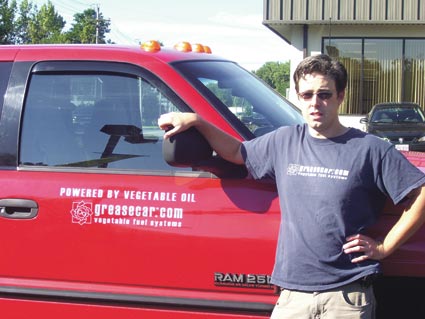
Justin Craven, president of Greasecar
Greasecar
Justin Craven, president of Greasecar in Holyoke, was attending Hampshire College when his interest was piqued about what was then called appropriate, or situation-based technology, in Third World developing countries. Specifically, it was the work of one Carl Bielenberg who initiated ways people could produce vegetable oil for soap production and edible oils using hand-operated presses and start cottage industries, which later evolved into the possibility of running generators on vegetable oil. That sparked Craven's interest.
Starting in the late 1980's and over the course of the next few years, Craven and crew experimented with developing dual-fuel kits that would allow - primarily autos at first - run on both diesel fuel and vegetable oil. "But ten years ago fuel prices were so low that no one was interested in alternatives, especially when new vegetable oil was too expensive," said Craven. But waste vegetable oil had little value and was used to feed stock especially in foreign countries. So the product was a perfect situation for Greasecar's needs.
"The initial conversion kits [for diesel engines] were sort of a novelty," said Craven, "bought usually for environmental reasons or as a hobby because they were interesting. But in the last three years [the kits have] proven to be a real cost saver and most people are [buying the kits] for economic reasons." The company has gone from selling a couple hundred conversion kits a year to three hundred kits a month. "We have sold more than five thousand kits [nationwide] mainly in 2006 and this year. We have gone from selling [kits] mostly for older model Mercedes and Volkswagens to now selling for later model [American made] pickup trucks and people who use their vehicles commercially."
How It Works
The kit for the Ford 7.3 liter diesel engine, one of the company's more popular kits, retails for approximately $2,300.00. "It's very much a drop-in kit, complete with brackets, and can be basically bolted on," said Craven. "We did an install for a magazine shoot by a person who had never seen one of our kits before and it took him about six hours to install the kit."
The Greasecar conversions are a dual-fuel system. "You have your conventional diesel system and we add on this heated vegetable oil system," said Craven. "It uses heat from the engine's radiator fluid to heat the vegetable oil." The vehicle is started using the diesel and once the vegetable oil is heated, a flick of a switch and the engine switches to the oil. At the end of the day, the operator pushes a button on the dashboard and in 15 seconds the system purges the vegetable oil and replaces it with diesel fuel for the next day.
"The conversion kits have been and are currently sold as mail order, do-it-yourself kits. But each is designed and manufactured as vehicle-specific to make the installation error-free," said Craven. Greasecar does have a customer service and technical support staff available to provide assistance on line and over the phone. "Which is one reason there are certain vehicles we don't support," said Craven, "because we cannot provide full, out-of-the box kits for them yet."
Currently Greasecar also sells kits for most pickup trucks through the 2000 model year and Ford model through 2003 and Dodges through 2006. There is a lag time between a new model and the availability of a dedicated kit because of the due diligence, including extensive road testing of a vehicle to insure that customers will have a worry free installation. And, notes Craven, there are some models that have so many inherent OEM problems that they are not under consideration for conversion.
New Challenges; New Markets
"Our business has been driven by fuel price differentials over the last few years," said Craven, "but once gasoline prices broke the four dollar mark people are realizing that this is a different situation."
"There is a lot of interest in alternatives [fuels] and anything that will save money," said Craven, "but the reality of alternatives and bio-fuels is not what is portrayed in the major media. There is enough of this waste oil feedstock to fuel hundreds of thousands of vehicles. The problem is a lot of it is being used for chicken feed." If that trend continues, said Craven, it could make it difficult for people to purchase the waste oil for fuel.
"On a short term basis we are trying to expand our ability to support customers by offering additional services, by having vehicles converted and for sale," said Craven, "and if we can be generating revenue on the installation [of conversion units] as well as direct product sales, then our profitability should be higher."
To learn more about the history of Justin Craven's company and its product line, go to www.greasecar.com.
